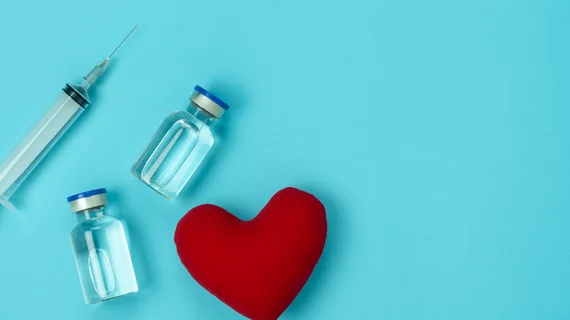New imaging evidence may link myocarditis in young adults to COVID-19 vaccination
New imaging data published Wednesday is further raising the possibility that rare recent cases of heart inflammation are tied to the COVID-19 vaccination.
Experts from the University of Massachusetts and Abbott Northwestern Hospital recently detailed MRI findings in 10 total cases of acute myocarditis temporally related to receipt of the shot. They believe this is the largest case series on this concern to date, incorporating a comprehensive timeline and systematic cardiac magnetic resonance (CMR) imaging evidence.
The U.S. Centers for Disease Control and Prevention in late May warned providers about several dozen cases of myocarditis, typically occurring within four days of the second vaccine dose.
“It is important to note that our small case series—while raising the possibility of a potential association based on the close temporal relation between a clinical and CMR picture of myocarditis and vaccination—does not prove that the COVID-19 vaccination was the cause of myocarditis,” Kirsten Shaw, MD, an internal medicine resident with Minneapolis-based Abbott Northwestern Hospital, and colleagues wrote June 16 in JACC: Cardiovascular Imaging. “Nor does it completely exclude spontaneously occurring myocarditis in these individuals. However, documenting such findings is important, given that the CDC and other regulatory agencies are now actively investigating this possible adverse reaction to the Pfizer-Bio Tech and Moderna COVID-19 mRNA-based vaccines.”
Abbott Northwestern Hospital experts used an institutional imaging protocol to search for swelling and nonischemic myocardial injury. JACC editors highlighted CMR as the “gold standard” for diagnosing myocarditis, outside of a biopsy. Sample patients included a 24-year-0ld man who presented with chest pain four days after his second Pfizer shot, and a 17-year-old teen female, both with no prior diagnosis of the novel disease. In addition, a 16-year-old male and 31-year-old female—both with no previous cardiac history, but a positive coronavirus test months prior—presented with chest pain after receiving a dose of the vaccine. In each of the four cases, CMR demonstrated acute myocarditis.
Meanwhile, a second set of cases from the University of Massachusetts Medical School detailed six more male individuals between the ages of 17-37 who experienced myocarditis after vaccination. Time between vaccination and presentation at the hospital ranged between 2-4 days and common symptoms included positional and pleuritic chest discomfort along with malaise. CMR was consistent with acute inflammation of myocarditis, and none of the six suffered additional complications.
Experts cautioned that the findings in both analyses are only preliminary and further work is needed to establish a connection. Both the CDC and UMass previously asserted that the benefits of receiving the vaccine still far outweigh the potential harms.
“We welcome a vigorous and scholarly scientific debate about the accuracy and significance of these findings,” Journal of the American College of Cardiology editors wrote in corresponding note. “Larger studies that vigilantly evaluate such patients using advanced imaging techniques might help clarify any possible causative association,” they added later.
Related COVID-19 Content:
Myocarditis, arrhythmias and more: An ACC update on what cardiologists know about long COVID-19
Athletes with COVID-19 may require heart MRI screening for myocarditis, new data suggest
4 cardiac arrhythmias associated with COVID-19
What we know about COVID-19 and cardiogenic shock
Mild COVID-19 infections not associated with long-term risk of heart damage
The pandemic’s toll: 55 long-term side effects of COVID-19
4 key takeaways from an updated look at vaccine-related myocarditis in the U.S.
Most young people with vaccine-related myocarditis recover quickly
Intrathoracic complications in COVID patients: Incidence, associations and outcomes
Congenital heart disease increases risk of poor COVID-19 outcomes, including death
MRI scans show COVID's 'significant' impact on the brain
Heart complication seen for the first time in a young patient after COVID-19 vaccination
American Heart Association investing $10 million to study the long-term consequences of COVID-19
Cardiologist discusses COVID-19, myocarditis among professional athletes and more
Not so fast: Specialists warn against cardiac imaging for asymptomatic COVID-19 patients
Study shows COVID-19 can infect heart cells—and do serious damage in the process

